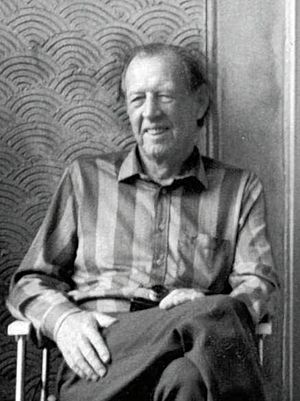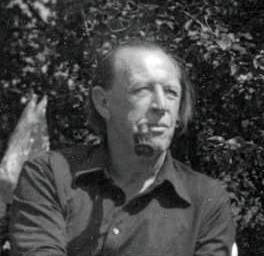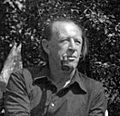Raymond Williams facts for kids
Quick facts for kids
Raymond Williams
|
|
|---|---|

Williams at Saffron Walden
|
|
| Born |
Raymond Henry Williams
31 August 1921 Llanvihangel Crucorney, Monmouthshire, Wales
|
| Died | 26 January 1988 (aged 66) Saffron Walden, Essex, England
|
| Alma mater | Trinity College, Cambridge |
| Era | 20th-century philosophy |
| Region | Western philosophy |
| School | Western Marxism |
| Notable students | Terry Eagleton |
|
Notable ideas
|
Cultural materialism Mobile privatisation |
|
Influences
|
|
|
Influenced
|
|
Raymond Henry Williams (born August 31, 1921 – died January 26, 1988) was a Welsh writer, teacher, and critic. He was a socialist, meaning he believed in a society where everyone is equal and works together.
Raymond Williams was very important in a movement called the New Left. This group wanted to change society and politics in new ways. His ideas about politics, culture, media, and books helped shape how people thought about these topics. He helped create the field of cultural studies, which looks at how culture works in society. He also developed the idea of cultural materialism, which connects culture to how people live and work.
Raymond Williams's Life
Growing Up in Wales
Raymond Williams was born in a small village called Pandy, in Wales. His father worked on the railway. In his village, most railway workers supported the Labour Party, which helps working people. Farmers often supported the Liberal Party.
Even though his area mostly spoke English, Raymond felt a strong Welsh identity. He once joked that if someone said their family came with the Normans, people from his village would ask, "Are you liking it here?" This showed their strong connection to Wales.
Raymond went to King Henry VIII Grammar School. When he was a teenager, Nazism was rising, and war was a big worry. He joined a local "Left Book Club," which helped him learn about world events like the Spanish Civil War and the invasion of Ethiopia. He also read Red Star Over China, a book about China.
In 1937, he went to a youth conference in Geneva, Switzerland, organized by the League of Nations. On his way back, he visited Paris and bought The Communist Manifesto. This was his first time reading the ideas of Karl Marx. At this time, he was a pacifist, meaning he believed in peace and was against war.
University Days
In 1939, Raymond won a scholarship to study English at Trinity College, Cambridge. While at Cambridge, he joined the Communist Party of Great Britain. He even helped write a pamphlet about the Russo-Finnish War. He said he was good at writing quickly, even about topics he didn't know much about.
He took his first university exams in 1941. After serving in the war, he returned to Cambridge and finished his degree with top honors in 1946. He later earned a higher degree called a Doctor of Letters in 1969.
Serving in World War II
Raymond Williams paused his studies to join the British Army in late 1940. This was against the Communist Party's view at the time, and his membership slowly ended. He first trained in military communications. Then, he was moved to work with artillery and anti-tank weapons.
He became an officer in the Guards Armoured Division from 1941 to 1945. He was sent to fight in Normandy after D-Day, which was a very chaotic battle. He commanded a unit of four tanks and described losing two of them while fighting. He never found out what happened to them.
He fought across Europe, through Belgium and the Netherlands, into Germany. He helped free a small Nazi concentration camp. He was shocked to see that the city of Hamburg had been heavily bombed by the British Royal Air Force. He had been told only military targets were bombed.
After the war, he was allowed to leave the army early to finish his studies. When he returned to Cambridge, he noticed that fewer students were interested in left-wing politics than before the war.
Teaching Adults and Writing Books
After graduating in 1946, Raymond became a tutor for adult education at Oxford University. He taught evening classes in English literature and drama. This job gave him time in the mornings to write. He started working on novels and the ideas that would become cultural studies.
In 1946, he also started a review called Politics and Letters. In 1951, he was called back to the army to fight in the Korean War. He refused to go, saying he was a conscientious objector (someone who refuses to fight in wars for moral reasons). He expected to go to jail, but a special panel agreed with him and let him go.
He wrote a book called Culture and Society in 1958, which became very popular. It explored how the idea of "culture" changed with the Industrial Revolution. This was followed by The Long Revolution in 1961. His writings were important to the New Left movement and were read by many people. He also reviewed books regularly for The Manchester Guardian newspaper.
Becoming a Professor
Because of his successful books, Raymond was invited back to Cambridge University in 1961. He became a fellow at Jesus College, Cambridge. Later, he became a Reader in Drama and then the first Professor of Drama at the university.
In 1973, he was a visiting professor at Stanford University in the United States. This experience helped him write his book Television: Technology and Cultural Form (1974), which is still useful today.
As a strong socialist, he was very interested in how language, books, and society are connected. He wrote many books and articles on these topics. One important book is The Country and the City (1973), which looks at literature and social history. His book Marxism and Literature (1977) explained his approach to cultural studies, which he called cultural materialism. This book used ideas from Antonio Gramsci, another important thinker. For an easier read, he wrote Culture (1981-1982), hoping it would become a new field of study.
Raymond's Big Ideas
Understanding Important Words
Raymond Williams was very interested in how the meanings of words change over time, especially words used to talk about culture. He started by looking at the word culture itself. His notes on 60 important words were supposed to be in his book Culture and Society.
Instead, he expanded them into a whole book called Keywords in 1976. This book looked at 110 words like "culture," "hegemony" (meaning leadership or control), and "violence." He added more words in a revised version in 1983. Williams explained that while the Oxford English Dictionary (OED) focuses on where words come from, his book focused on their changing meanings and how they are used in different situations. In his 1981 book Culture, he defined culture as a "realized signifying system," meaning how we create and understand meaning in our lives.
Discussing Ideas
Williams disagreed with some of Marshall McLuhan's ideas about technology. McLuhan believed technology strongly determined society. In his book Television: Technology and Cultural Form, Williams argued that social reasons are more important than technology in how human processes develop. He believed that while things can set limits or create pressures, they don't completely control or predict what happens in society.
He also wrote Modern Tragedy, which was a response to another critic's book called The Death of Tragedy. Later, he was interested in the work of Pierre Bourdieu, another thinker, but found Bourdieu's ideas too negative about the chances for social change.
Later Life and Legacy
Raymond Williams joined the Labour Party in 1961 but left in 1966. He joined the Vietnam Solidarity Campaign and helped write the May Day Manifesto in 1967. Some people have said he later became a member of Plaid Cymru, a Welsh nationalist party.
He retired from Cambridge in 1983 and spent his last years in Saffron Walden. There, he wrote Loyalties, a novel about people who were interested in Communism in the 1930s.
Williams was working on a big historical novel series called People of the Black Mountains. It was about people who lived in his home area of the Black Mountains throughout history. He imagined their lives from ancient times up to the present. He had finished the stories up to the Middle Ages when he passed away in 1988. His wife, Joy Williams, prepared his unfinished work for publication.
In his last years, Williams connected his ideas to feminism, peace, and the ecology movement. He believed that with many different societies in the world, there wouldn't be just one type of socialism, but many. He thought that the labor movement and the ecology movement should work together.
After his death, the Raymond Williams Society was started in 1989 to continue his work. They publish a journal called Key Words: A Journal of Cultural Materialism. There is also the Raymond Williams Foundation, which supports adult education. A project called the "Keywords Project" continues his work on cultural words. Other books, like New Keywords, have also built on his ideas.
In 2007, many of Williams's writings and papers were given to Swansea University by his daughter, Merryn.
What Raymond Williams Wrote
Novels He Wrote
- Border Country (1960)
- Second Generation (1964)
- The Volunteers (1978)
- The Fight for Manod (1979)
- Loyalties (1985)
- People of the Black Mountains 1: The beginning (1989)
- People of the Black Mountains 2: The Eggs of the Eagle (1990)
Books on Culture and Society
- Reading and Criticism (1950)
- Drama from Ibsen to Eliot (1952)
- Preface to Film (with Michael Orrom) (1954)
- Culture and Society (1958)
- The Long Revolution (1961)
- Communications (1962)
- The existing alternatives in communication (1962)
- Modern tragedy (1966)
- New Left May Day manifesto (with S. Hall and E. P. Thompson) (1967)
- May Day Manifesto: 1968 (1968)
- Drama in performance (1954, revised 1991)
- Drama from Ibsen to Brecht (1961, revised 1993)
- The Pelican Book of English prose. Vol. 2, From 1780 to the present day (editor) (1969)
- The English novel from Dickens to Lawrence (1970)
- Orwell (1971)
- "Base and superstructure in Marxist cultural theory" (1973)
- The Country and the City (1973)
- D.H. Lawrence on education (with Joy Williams) (1973)
- George Orwell: a collection of critical essays (1974)
- Television technology and cultural form (1974)
- Keywords: A Vocabulary of Culture and Society (1976)
- English drama: forms and development: essays in honour of Muriel Clara Bradbrook (editor with Marie Axton) (1977)
- Marxism and literature (1977)
- Politics and Letters: Interviews with New Left Review (1979)
- Problems in materialism and culture: selected essays (1980)
- Culture (1981)
- Contact: human communication and its history (editor with Ferruccio Rossi-Landi et al.) (1981)
- Socialism and ecology (1983)
- Cobbett (1983)
- Towards 2000 (1983)
- Writing in society (1983)
- John Clare: selected poetry and prose (editor with Merryn Williams) (1986)
- Raymond Williams on television: selected writings (edited by Alan O'Connor) (1988)
- What I came to say (1989)
- Resources of Hope: Culture, Democracy, Socialism (1989)
- The Politics of Modernism. Against the New Conformists (1989)
- The Raymond Williams reader (edited by John Higgins) (2001)
- Tenses of imagination: Raymond Williams on science fiction, utopia and dystopia (edited by Andrew Milner) (2010)
Short Stories
- "Red Earth" (1941)
- "Sack Labourer" (1941)
- "Sugar" (1941)
- "This Time" (1943)
- "A Fine Room to be Ill In" (1948)
- "The Writing on the Wall" (1990)
Plays He Wrote
- Koba (1966)
- A Letter from the Country (1966)
- Public Enquiry (1967)
See also
 In Spanish: Raymond Williams para niños
In Spanish: Raymond Williams para niños
Images for kids
 | Jessica Watkins |
 | Robert Henry Lawrence Jr. |
 | Mae Jemison |
 | Sian Proctor |
 | Guion Bluford |




